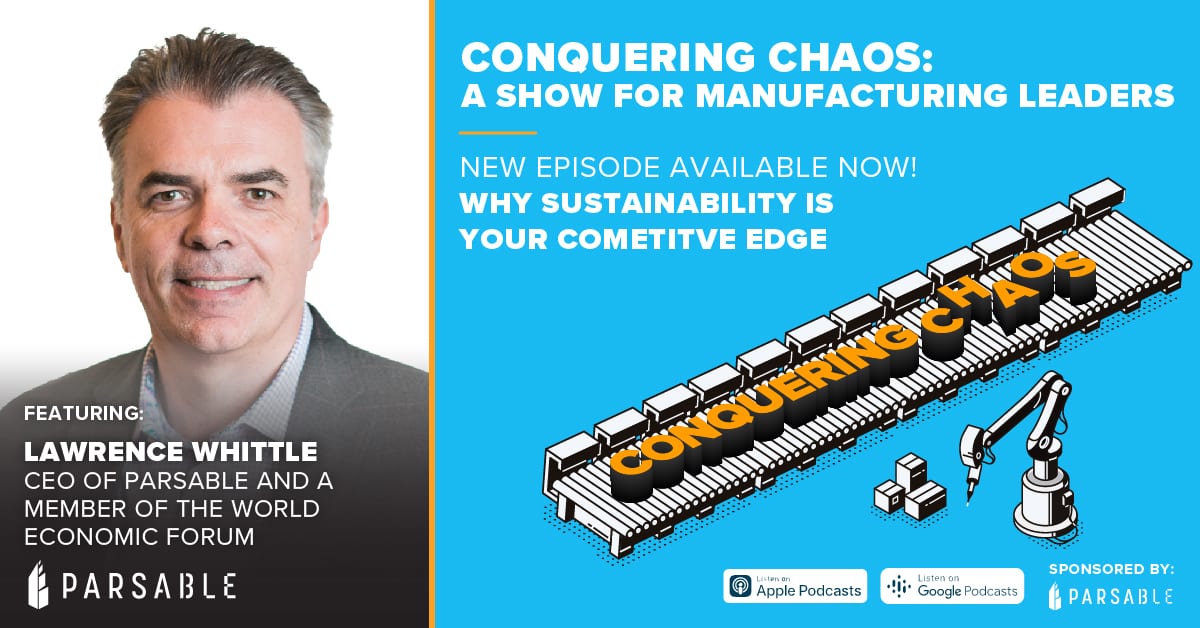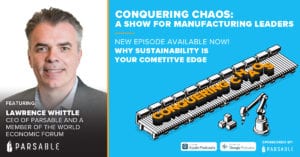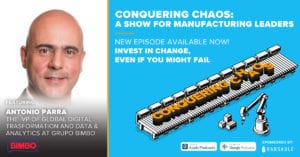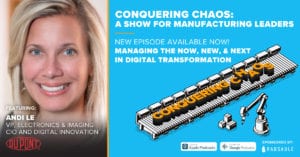Why Sustainability is Your Competitive Edge

Too many organizations, becoming more sustainable looks like more dollars being spent. In reality, it’s just the opposite.
In this inaugural episode of Conquering Chaos, we’re joined by the CEO of Parsable and a member of the World Economic Forum, Lawrence Whittle. Lawrence shares why sustainability can be used as your competitive advantage, as well as…
– How sustainability is impacting shifting work dynamics
– The impact of sustainability on production
– How reducing waste improves ROI
– Small changes you can make now to drive a culture of sustainability
______________________________________________________________________________________________________________
Are you ready to start your digital transformation journey? Request a demo today.

_______________________________________________________________________________________________________________
Check out a snippet from the episode:
[00:00:00] Lawrence Whittle: When you think about the dynamic of the workforce, retiring your need and ability to hire, retain people. Part of the challenge is they weren’t particularly excited about the industry, but also, they’ve got this burning desire to work with companies that do actually take sustainability seriously.
[00:00:19] Josh Santo: Welcome to Conquering Chaos, the show for manufacturing leaders. In each episode, we’re connecting you to the manufacturing leaders of today who are driving the innovations needed to future-proof the operations of tomorrow. If you feel like your time is spent fighting fires and trying to control the everyday chaos, this show is the show for you. My name is Josh Santo. I’ll be your host.
All right, welcome to the show. So, with me I’ve got the CEO of Parsable, Lawrence Whittle. He’s got two decades of enterprise software experience, global experience at that, and he started his career in manufacturing software, but now he’s helping to drive a new category of software called connected worker. Lawrence, thank you so much for being on the first episode of Conquering Chaos. How are you doing today?
[00:01:07] Lawrence: I’m doing great, Josh, and thanks for having me. And I’m delighted to be with the first, and, yeah, you mentioned about my background. You know, it’s really interesting in this really challenging year to just reflect on my last couple of decades. And as you mentioned, you know, I started in manufacturing software back in the ’90s and early 2000s, and a lot of technology was being emerging at that stage. And now, you know, as we live through the 2020 pandemic, as you mentioned, I’m driving this new category of connected work and I remain very, very motivated and excited. So, thanks for having me on.
[00:01:35] Josh: Absolutely. So, our topic today is sustainability as your competitive edge. And I know that this is a topic that you brought to my attention. I know sustainability is something that you’re particularly passionate about, and I would love if we started our conversation by having you directly share with our audience, why is it that sustainability is an important topic to you?
[00:01:55] Lawrence: Absolutely, Josh. So, this sort of goes back some time. It’s not something that I’ve sort of just jumped on the bandwagon recently. As you can probably hear originally from the UK, and I actually left London over 30 years ago. And one of the things I noticed when I moved to the US, you know, 15 years ago, I’ve been in the US for, you know, for business for almost two decades, is that just the general awareness of the environment, it’s just a lot stronger in Europe.
And as I came into the US, I started to wonder why that was, and I don’t really know why it is, but this definitely was from my early sort of years in Europe, that just a lot more aware of the environment, pollution, etc. So, it sort of was in my early DNA. But the reason why it’s really become, you know, really front of mind to me is two reasons. Firstly, you know, I have three children. They’re all, obviously, you know, either teenagers or early 20s. I’ve got one that’s 16, one that’s 21 and one that’s 22. And, you know, their whole life has been driven around the awareness of the environment.
And so, you know, as I’ve listened to them and how important that generation and millennials and Gen Z’s view this I started to really, you know, realize how important this is, not just for now but certainly for the future generations. Tha-that’s the first, sort of, the primary reason, history, then my-my kids. And then, more recently, as I’ve got actively involved in the World Economic Forum, over the last couple of years, you know, I started to get a hold of a lot of really, really clear data around what was going on in the world around the topic of sustainability. So, you know, it came from my roots, accelerated with my children, and then in the last couple of years, as I’ve gotten more and more data, it’s just become, you know, really front of mind for me.
[00:03:32] Josh: That’s great. So, not only are you an accomplished leader in the software industry but accomplished in the family life as well. Having that awareness, having something that really u-unites the family outside of work, something like sustainability which, you know, really has an impact on all of us is something that does tend to resonate with a younger generation, in particular millennials and Gen Z. So your kids, based on the age range, that would make them Gen Z. Is that correct?
[00:03:59] Lawrence: Correct, yes.
[00:04:00] Josh: Got it. Well, I think that that’s, like, you know, an important thing for you to bring up is not just your children but that idea of the younger generation really resonating with an issue like this because it’s one of the topics and one of the questions I wanted to pick your brain about. I know that within the manufacturing industry, and really beyond the manufacturing industry, there is this crisis of how do we replace the retiring workforce?
How do we lean on, leverage, and empower the incoming generation, the millennials and, in particular, Generation Z, how do we draw them into our operations and how do we have them power the future of the operations? So, kind of connecting to that idea of, you know, you’ve got kids firsthand who are passionate about this subject as you are, how do you see sustainability as it impacts these shifting workforce dynamics?
[00:04:49] Lawrence: It’s, perhaps, the most misunderstood subject.I think everyone knows there is a retiring workforce. People have heard about things like the great tsunami, they’ve heard about, you know, the-the average age of the workforce. But when you actually look at the-the hard facts, Josh, it’s pretty out-outstanding to sit back and think about the impacts. This without doubt is an existential risk on the world. And the reason why the two top topics in the World Economic Forum in Davos this year and have been on the agenda, are sustainability and the future of work is because they are intrinsically linked.
You know, by 2025, so less than five years, 75% of the global workforce will be at least millennials. You know, you’ve got an estimated 30% to 40% of the industrial world domestically here in North America that are late-stage Baby Boomers in the world. So, if you think about this dynamic of this huge amount of people leaving the workforce and they’re leaving it after having spent 20 years, maybe even more, they’re 20, 30-year veterans, they joined as an apprenticeship and then stayed, and they’ve got a tremendous amount of tacit knowledge. So, first issue, they’re leaving. Second issue is that there’s a lot of fake news around, you know, the future of work and robots and automation.
Factually, there is already a predicted shortage of a couple of million open unfilled jobs in industry here in North America and this pattern is across the world. And so you take these sorts of issues and then you think, “Well, what do we do?” Well, we’ve got a hire in gen Z’s and beyond. And if you poll gen Z’s around the world and say, “Would you like to go and work in an industrial company?” First of all, they might ask what an industrial company is. They probably will then say no. And the reason they will say no is that there’s been a perception that the industrial world is noisy, it’s dirty, it’s repetitive. There’s no real technology. It’s actually far from the truth.
When you go into a lot of our customers, a lot of companies, it’s actually quite an inspiring environment, but there is this, you know, perception. And part of the perception is related to sustainability. If you think about the subject of climate change, everyone knows that it’s related to CO2 emissions and a lot of people will understand that CO2 emissions are related to industrial activity. In fact, there’s a lot of detail on this which I think is worth just sharing. So industrial activity, obviously, does create a huge amount of CO2 emissions, commercial real estate also drives a lot of, you know, CO2 emissions because they’re just inefficient buildings and, you know, people have windows open, et cetera.
So when you think about the dynamic of the workforce retiring, your need and ability to hire, retain people, part of the challenges is they weren’t particularly excited about industry, but also they’ve got this burning desire to work with companies that do actually take sustainability seriously and sustainability on the sort of the ESG umbrella, you know, environmental, sustainability, and governance. These people are mission-driven and so you sort of step back, you start to realize the retiring workforce, big issue, our ability to hire is a big issue. And part of the issue is because of the perception around sustainability. So that’s how these things are all sort of interconnected, Josh.
Listen to find out how sustainability impacts the workforce dynamics.




